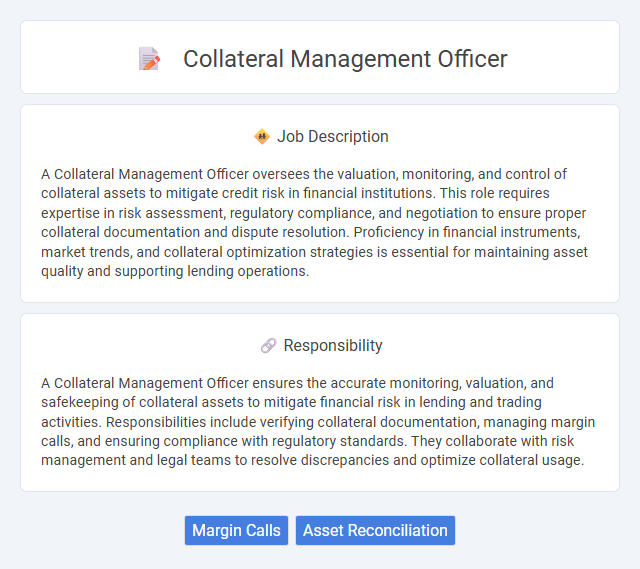
A Collateral Management Officer oversees the valuation, monitoring, and control of collateral assets to mitigate credit risk in financial institutions. This role requires expertise in risk assessment, regulatory compliance, and negotiation to ensure proper collateral documentation and dispute resolution. Proficiency in financial instruments, market trends, and collateral optimization strategies is essential for maintaining asset quality and supporting lending operations.
Individuals with strong analytical skills and attention to detail are likely to be suitable for the role of a Collateral Management Officer, as the job requires careful assessment of collateral assets and risk mitigation. Those who thrive in high-pressure environments and possess good communication abilities may also find this position aligns well with their capabilities. Conversely, candidates who struggle with organization or lack financial acumen might face challenges in meeting the demands of this role.
Qualification
A Collateral Management Officer typically requires a bachelor's degree in finance, economics, or business administration, with strong analytical skills and proficiency in risk assessment and regulatory compliance. Experience with collateral valuation, margining processes, and familiarity with financial instruments such as derivatives and securities is essential. Advanced knowledge of relevant software systems, attention to detail, and effective communication skills are also critical qualifications for success in this role.
Responsibility
A Collateral Management Officer ensures the accurate monitoring, valuation, and safekeeping of collateral assets to mitigate financial risk in lending and trading activities. Responsibilities include verifying collateral documentation, managing margin calls, and ensuring compliance with regulatory standards. They collaborate with risk management and legal teams to resolve discrepancies and optimize collateral usage.
Benefit
A Collateral Management Officer is likely to experience significant benefits such as enhanced risk mitigation and improved financial stability for their organization. This role may increase the probability of efficient asset protection and streamlined collateral processes, leading to reduced operational risks. Career growth opportunities and exposure to complex financial instruments could also be expected outcomes of this position.
Challenge
A Collateral Management Officer likely faces the challenge of ensuring accurate valuation and timely monitoring of collateral to minimize credit risk. The role probably requires navigating complex regulatory requirements and evolving market conditions, which can impact collateral eligibility and valuation methods. Managing discrepancies and maintaining clear communication between multiple stakeholders may present ongoing difficulties in this position.
Career Advancement
A Collateral Management Officer plays a critical role in monitoring and safeguarding assets that secure loans and financial transactions, ensuring risk mitigation and regulatory compliance. Career advancement opportunities typically include progressing to senior collateral manager roles, risk management positions, or specialized finance executive roles, leveraging expertise in asset evaluation, exposure analysis, and operational risk management. Mastery of collateral management software, strong analytical skills, and a thorough understanding of market regulations significantly enhance promotion prospects within financial institutions.
Key Terms
Margin Calls
A Collateral Management Officer specializes in overseeing margin calls to ensure adequate collateral is maintained against trading positions, minimizing counterparty risk. This role involves continuous monitoring of market fluctuations and timely determination of collateral requirements based on predefined credit agreements and regulatory standards. Expertise in risk assessment, negotiation with counterparties, and proficiency in collateral optimization tools is critical for efficient margin call processing and financial stability.
Asset Reconciliation
A Collateral Management Officer specializing in Asset Reconciliation ensures accurate matching of collateral assets with loan or derivative positions to minimize risk exposure and maintain regulatory compliance. Responsibilities include verifying ownership, updating records in collateral management systems like Murex or Calypso, and resolving discrepancies between internal databases and custodians. Expertise in accounting principles, financial instruments, and strong analytical skills are crucial for effective collateral reconciliation and operational efficiency.
 kuljobs.com
kuljobs.com